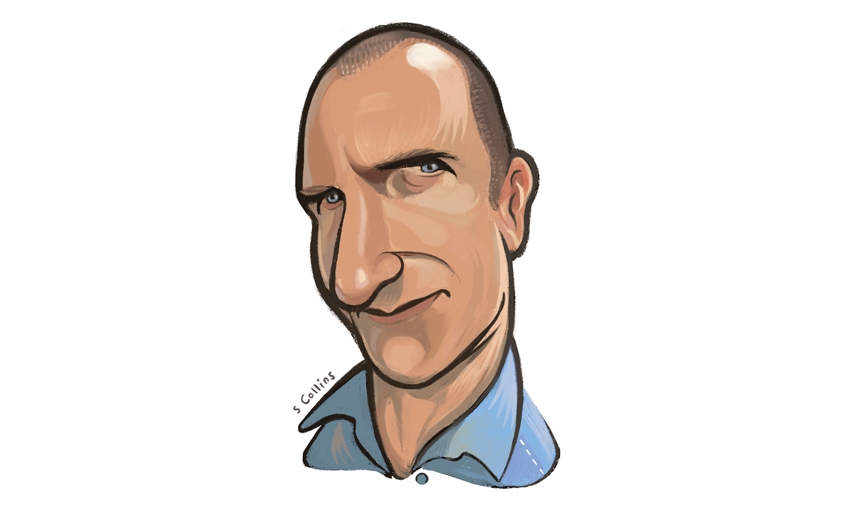What’s the matter with Ralph Nathaniel Twistleton-Wykeham Fiennes? In pictures, he looks so self-conscious and morose. Maybe it’s just his acting face.
In the flesh, though, he’s different. He is friendly. Midway through what must be an exhausting press junket at the Soho Hotel, he remains remarkably enthusiastic, and eager to discuss Coriolanus, his new film, of which he is both director and leading man.
‘It’s Shakespeare at his bleakest,’ he says, excitedly. ‘He’s not offering us, as he does in the comedies and in some of the histories, a sense that the future is full of hope. He is exposing the continual dysfunction of us humans as political or tribal entities, that we are constantly jockeying for power, position or angrily expressing our needs. I feel it’s a sort of evisceration of man — it ends with the evisceration of a man.’
Does Fiennes sound pretentious? He isn’t. He’s a bit of a thesp, perhaps — at one point, he picks up my copy of Coriolanus and starts loudly reciting a long scene — but there’s nothing wrong with that. He’s an actor, after all.
He played Coriolanus on the stage in 2000, and is clearly drawn to the conflicted figure of the Roman general. ‘It’s thrilling,’ he says, ‘I feel he is like some magnificent beast or animal; like a horse that has always been trained to be this pure thing. Then suddenly the trainer — his mother — turns around and says, “Can you actually be this entirely other thing?” So he tries but then suddenly it all fucks up and goes crazy.’
It’s said that Coriolanus is Shakespeare’s most political play. What with the cast (Fiennes and Vanessa Redgrave, who plays Volumnia, are both Unicef ambassadors), the present-day setting in Serbia, and the themes of starvation, power and corruption, it’s tempting to dismiss the film as luvvie propaganda about the evils of the modern world. But it isn’t. It is excellent, in fact, full of contradictions and complexity, like the play. ‘What I like is that there isn’t a nice, easy, compact message,’ says Fiennes. ‘I’ve always felt there was a kind of honesty in it as a play that says “Look, it’s all a terrible fucking mess, isn’t it?”’
Fiennes isn’t one of those actors who thinks that film is inferior to the stage. On the contrary, he says that cameras enabled him to play Coriolanus with more subtlety. ‘I think that, with close-ups, you can hint at things, you can suggest things that you can’t do on stage. The challenge — the problem, possibly — of Coriolanus the man on stage is that he is always in a rage and when he’s not in a rage, you don’t get to see it. But in a film you get the chance to go in close and imagine what he is thinking and feeling.’
It’s not easy to tell what Fiennes himself thinks and feels. Every question aimed at him turns into a further discussion of the play, or the futility of man’s existence. Maybe he is a bit like Coriolanus, Shakespeare’s ‘lonely dragon’? ‘I identify with him emotionally,’ he replies, hesitantly, ‘but not in my head. I feel sympathy for him. I think he’s like a Samurai, completely focused. He is a tragic figure too because, underneath it all, he is a boy. He has got no emotional maturity, no ability to negotiate or compromise in everyday social intercourse.’
It can’t be a coincidence, though, that Fiennes has played so many dark, brooding parts — Heathcliff, Amon Goeth in Schindler’s list, Hades, Lord Voldemort in Harry Potter. He agrees. ‘I like it if a part can be dark but still have conflict, someone wrestling with something inside them. That does interest me, yes. I think even Voldemort ended up having a little bit of something conflicted.’
What does that say about Fiennes himself? ‘I don’t know,’ he says. ‘I’d like my analyst to tell me!’ He laughs a slightly wild laugh.
Perhaps his interest in angst comes from being raised Catholic. His uncle is the distinguished theologian Nicholas Lash and, while Fiennes is not a believer today — ‘probably atheist, I think’ — he is fascinated by ideas of redemption and salvation. While filming Coriolanus’s exile from Rome, he says, ‘Biblical images kept popping into my head.’
He likes Caravaggio and Dostoyevsky, too. Intriguingly, he is attracted to the sinister figure of Svidrigaïlov in Crime and Punishment. ‘He is a sort of predator, a sexual predator,’ he says, ‘a very worrying figure. But even he has this terrible sense of isolation and you sort of feel for him despite everything. So there’s forgiveness, and that of course has a Christian root.’
He is quick to add that the Catholic Church disturbs him. ‘When religious things become so codified, so doctrinal and extreme, then they become for me very frightening.’ He isn’t keen on Pope Benedict XVI. ‘I don’t think anyone who considers themselves an enlightened Catholic can like him. Can they? I don’t know though, I’m quite ignorant.’
That’s Ralph Fiennes. Whenever he seems to be parking his personality on pseuds’ corner, he redeems himself with a self-deprecating aside. He’s sensitive, really, and shy. He says that as an actor he feels ‘terribly vulnerable’ to critics: ‘I dread that they’ve got it right and it’s all a pile of shit and what’s the point and why don’t I give up and go home! … Directing might be worse. It was really quite scary, especially editing in the early stages, when you feel, “My God. This is rubbish.”’
‘It’s a terrible sort of neurosis,’ he says, tapping his head. ‘With the good reviews, you just think “Phew!” You’re relieved and you can forget it. But you always remember the bad ones.’






Comments